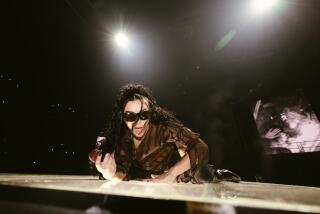POP WEEKEND : Ex-X Vocalist Cervenka Does Own Thing and Does It Well
- Share via
SAN JUAN CAPISTRANO — The decision to put X on indefinite hold must have come as a relief to its former members.
During the last years of the Los Angeles band’s run, questions of motivation and direction kept cropping up whenever it put out a new record. Was X being too naked in its desire for mainstream success? Was it paying sufficient attention to its old firebrand roots as the West Coast’s seminal punk band? Should it emphasize its interest in rock’s traditional roots in country and folk music? Or should it mount the feverish attack of the banshees that it was capable of unleashing?
Playing at the Coach House on Friday night, X-alumna Exene Cervenka was free to go prospecting among different roles and styles without worrying about repercussions. Oh, the audience wasn’t bashful about shouting for X favorites between numbers, but it didn’t seem too disappointed when Cervenka and her three-man band stuck resolutely to playing every song from her well-balanced solo album, “Old Wives’ Tales.” (Near the end, Cervenka showed that she was a sport by tossing in a fun, stomping version of X’s countrified “Skin Deep Town.”)
Cervenka comfortably assumed several guises during her 75-minute show. She was a protest-folkie singing pretty songs in a thin, airy voice; a politically confrontational beat poet who fired off deadpan spoken recitations and improvisations over avant-garde instrumental squiggles and coffee-house jazz-blues backing; and a country singer with a twang in her voice that gave an ironic cast to songs about domestic relationships. Cervenka’s band played with restraint for the most part, but in a few harder-charging moments she stepped back into the role of the shimmying-stepping, head-shaking rocker that she played in X.
With all that variety, Cervenka and a band that featured fellow X alumnus Tony Gilkyson on guitar had no trouble weaving a consistently interesting show after a flat opening that prompted Cervenka to apologize for rustiness.
The only real drawback to the performance was the heavy-handedness of some of Cervenka’s political broadsides. In her spoken monologue, and in songs like “Here Come the Crucifiers,” a tirade against thought-policing fundamentalists, she was guilty of an intolerance and an eagerness to demonize the opposition that seems to be the worst fault of her foes. Cervenka’s stridence may earn her points among those who value political zeal for its own sake, but it is not very helpful in a society where baiting has shoved aside debate as the most common currency of political discourse.
Cervenka did better as a politicized singer when she focused less on bashing the bad guys and more on conveying her own emotional responses to a dangerous world. “Leave Heaven Alone” was a fragile-sounding, deeply saddened plea against the militarization of space. “She Wanted” wryly expressed the dejection of a political battler--perhaps Cervenka herself--who feels hopelessly overmatched: “She believes the meek shall inherit the earth / But by then it won’t be worth much.”
Cervenka quickly rallied her spirits on the next song, a show-closing rendition of “Do What I Have to Do,” a Phil Ochs anthem full of determination and positive hope for change.
Political commentary may have been the show’s connecting strand, but Cervenka kept her politicization from being obsessive. The set included nicely observed character sketches of struggling and self-doubting artists, a wistful country-rock love song, and more exuberant country and rockabilly rave-ups. Cervenka’s band, with bassist Duke McVinnie and drummer Jim Christie joining the dexterous Gilkyson, supported her with sensitive playing that fostered intimacy on quieter songs, yet packed a punch on high-kicking numbers like the country two-step “White Trash Wife” and the rockabilly-powered “Coyote on the Town.”
The Slugs, a young Orange County band, opened with a set of garage rock that was a bit above average because most of the original songs were reasonably melodic and took a point of view, often with a socially conscious slant. The Slugs’ sound wasn’t distinctive. Vocals were earnest but thin, the guitar playing was yeomanly psychedelic, and the rhythm section was--well, sluggish. The Slugs apparently have a following, and they won enough applause to get an encore. Unfortunately, they used it to play an inept, denatured version of “Honky Tonk Women.”
More to Read
The biggest entertainment stories
Get our big stories about Hollywood, film, television, music, arts, culture and more right in your inbox as soon as they publish.
You may occasionally receive promotional content from the Los Angeles Times.










